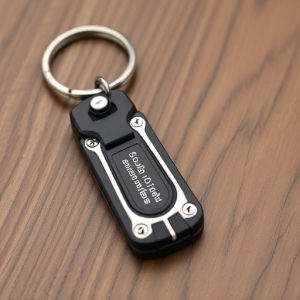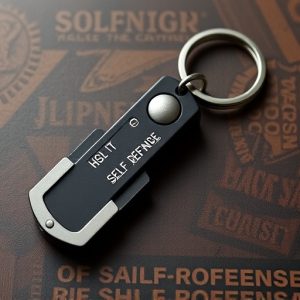Mastering Legal Compact Everyday Carry Keychain Weapons Guidelines
Citizens considering Compact Everyday Carry (CEC) keychain weapons for self-defense must first under…….
Citizens considering Compact Everyday Carry (CEC) keychain weapons for self-defense must first understand state laws, which vary widely in age restrictions, permit requirements, and allowed weapon types. These tiny tools, including foldout knives and tactical pens, are legally categorized as small, concealed personal protection devices, with legality varying by area—some permit open carry while others restrict them to concealed possession. Responsible ownership requires navigating local regulations, obtaining permits or licenses involving background checks and training, adhering to restrictions on weapon types, blade length, and functionality, and avoiding no-go zones like schools and government buildings. The ultimate goal is to have a reliable self-defense tool integrated seamlessly into daily life while prioritizing safety and legality.
“Unraveling the legal landscape surrounding compact everyday carry keychain weapons is essential for responsible citizens aiming to protect themselves. This comprehensive guide navigates the intricate state laws governing these portable self-defense tools, offering insights into their legal definition, categories, and carrying requirements. From understanding best practices for safe handling to dispelling common misconceptions, this article equips readers with knowledge to make informed decisions regarding compact everyday carry keychain weapons.”
- Understanding State Laws on Compact Everyday Carry Keychain Weapons
- Legal Definition and Categories of Keychain Weapons
- Requirements for Legal Carrying of Keychain Weapons
- Best Practices for Safe and Legal Everyday Carry
- Common Misconceptions and Frequently Asked Questions About Keychain Weapons
Understanding State Laws on Compact Everyday Carry Keychain Weapons
Understanding state laws regarding Compact Everyday Carry (CEC) keychain weapons is essential for responsible citizens looking to arm themselves for self-defense. Each U.S. state has its own set of regulations governing the concealed carry of firearms, and this includes compact keychain weapons designed for everyday carry. These small, often concealable tools can provide a sense of security, but users must be aware of local laws before acquiring and carrying such devices.
State laws vary widely in terms of age restrictions, permit requirements, and the types of weapons allowed as CECs. Some states explicitly prohibit the carry of certain compact keychain weapons, while others may have loopholes or specific exceptions. It’s crucial to research and understand the legal framework in your state to ensure compliance with the law and avoid any potential legal issues.
Legal Definition and Categories of Keychain Weapons
In many jurisdictions, compact everyday carry keychain weapons are legally defined as small, concealed tools designed for personal protection. These devices often fall under specific categories, each with its own set of legal implications and restrictions. One common category includes foldout knives with blades that can be easily deployed but remain hidden from plain sight. Another might be specialized tools like tactical pens or compact flashlights with sharp ends, intended for self-defense in emergencies.
The legality of keychain weapons varies greatly across states and countries, with some areas allowing their open carry while others restrict them to concealed possession. These tools are often marketed as “defensive keychains” due to their small size and ease of carrying—a feature that also makes them popular for everyday use. Understanding local laws is crucial before considering the acquisition or open display of any compact everyday carry keychain weapon.
Requirements for Legal Carrying of Keychain Weapons
Carrying a compact everyday carry (ECC) keychain weapon is subject to stringent legal guidelines that vary by state. To ensure compliance, it’s crucial to understand and meet specific requirements for legal carrying. In most jurisdictions, obtaining a permit or license is mandatory before legally wielding a keychain weapon in public. These permits typically involve background checks, training, and proof of need, such as personal safety or security concerns.
Additionally, there are restrictions on the type of weapons allowed under ECC laws. Compact everyday carry keychain weapons should be designed for self-defense purposes only and adhere to local regulations regarding blade length, overall size, and functionality. Users must also familiarize themselves with specific no-go zones where carrying such devices is prohibited, including schools, government buildings, and certain transportation hubs.
Best Practices for Safe and Legal Everyday Carry
When it comes to carrying a compact everyday carry (ECC) keychain weapon, safety and legality should always be top priorities. Best practices involve understanding local and state laws regarding concealed carry permits and restrictions. Always ensure the weapon is secured within the keychain, preventing accidental deployment in public settings. Regular training in safe handling and shooting is essential to minimize risks and demonstrate proficiency.
Choosing the right ECC requires careful consideration of factors like size, weight, and ease of use. Opt for a compact design that seamlessly integrates into your everyday carry gear without causing discomfort or drawing unnecessary attention. Remember, the goal is to have a reliable tool readily available when needed while adhering to legal requirements and promoting personal safety.
Common Misconceptions and Frequently Asked Questions About Keychain Weapons
Many people harbor misconceptions about compact everyday carry keychain weapons, often referred to as EDC (everyday carry) tools. One common myth is that they are primarily meant for self-defense in large cities with high crime rates. In reality, these tiny gadgets are versatile tools designed for a variety of situations—from opening packages and turning on lights to helping in an emergency. They offer peace of mind, especially when traveling or in situations where you might not have easy access to other tools.
Another frequently asked question revolves around legality. While laws vary by state and country, many compact keychain weapons are legal for carry if they meet certain criteria, such as having a non-threatening design and being used responsibly. It’s crucial to research local regulations and understand the specific rules regarding size, functionality, and permitted environments. Remember that knowledge is key; understanding these tools and their legal implications ensures responsible ownership and usage.
The legal landscape surrounding compact everyday carry keychain weapons varies widely across states, highlighting the importance of understanding local regulations. By familiarizing yourself with the legal definitions, categories, and requirements outlined in this article, you can ensure safe and responsible carrying practices while navigating these guidelines. Remember, staying informed is key to exercising your rights as a legally armed citizen, promoting public safety, and respecting the diverse regulatory approaches at the state level.


